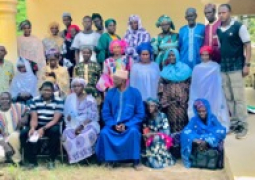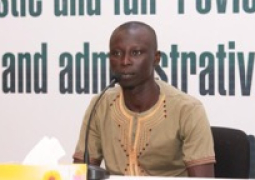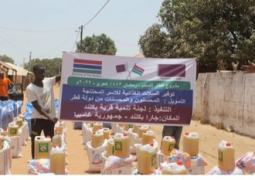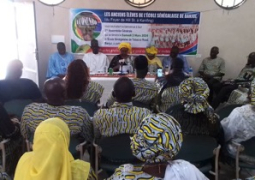
Professor Barry, who doubles as President of The Gambia Writers Association, made these remarks at the commemoration of the World Book and Copyright Day by The Gambia Writers Association.
The event held at Alliance Francaise along Kairaba Avenue accorded him the opportunity to lecture participants on ‘Indigenous Knowledge production to preserve our languages’.
Addressing participants, Professor Barry stated that people have a way of preserving their knowledge, but unfortunately ‘because we have never done any knowledge production, as such we have never really taken the writing component or translation into book; and most of knowledge got lost, because it was inherited.’
“The blacksmith would teach how to hit the metal, bend it and make a tool out of it, but they can only teach their sons. But they cannot write it in a book. And blacksmiths also have secrets of how to bend the metal and all of that, as they learnt that secret, but that secret remains in the family. Unfortunately, if the family goes extinct, that knowledge goes extinct.”
Dr. Barry made reference to historians, who also do the same thing. The renowned educationist reminded that such is the very rationale behind the French’s introduction of assimilation as a colonial policy during colonialism, which he said, is aimed at learning French language and in so doing, equally learning French culture.
“So it is true learning that culture, you will come to preserve and come to appreciate and understand the differences. The same like us; if we don’t learn our language, naturally we don’t understand our culture, and I have to believe that sometimes if you don’t understand the culture of the other, you have a way of judging them wrongly.” he expressed.
This, Dr. Barry believes, is what is creating cultural conflict; further clarifying that cultural diversity will not happen ‘if people don’t appreciate difference as enrichment.’
“The difference is an enrichment of you because you are what you are. You cannot be more than what you are. But then, by living and cohabiting with another culture, you come to learn how they live, come to learn what they like, come to learn what they eat, [and] you come to learn how they wear."
“To me, I like to go to a cultural dance where I find the Jola dancing. Why? Because it is a symbol of expression of a people’s identity, and we only lose those things when we do not produce them. If you do not preserve them, then you lose them,” the Gambian professor forewarned.





